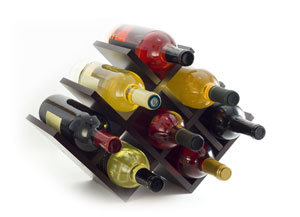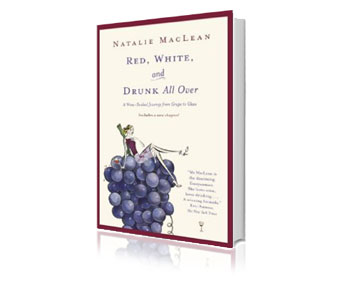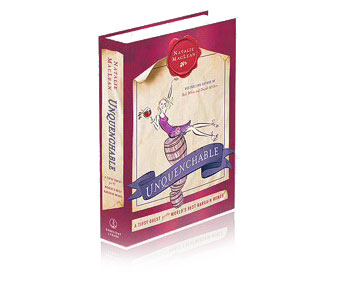Wine Snobbery
http://A Wine Snob? Pas Moi!By Natalie MacLean
In the vestibule of my home, the other dinner guests sweep past Sebastian as he clutches his bottle of wine like a talisman to ward off evil spirits—their wines. I have to coax him to join the group in the dining room by telling him about my antique corkscrew. While he's distracted with its mechanics, I whisk his bottle into the kitchen to decant it. Later, as we sit down to dinner, he sniffs suspiciously at my stemware, holding it up to the light to check for spots. Then he clears his palate with several conversation-silencing throat noises while ceremoniously breaking the bread. Sebastian is a wine connoisseur by conviction, a snob by reputation.
We all know a wine snob, but mon Dieu, we'd never admit to being one. It's more fashionably correct to be a champion for wine democracy, waving the banner of "all you need to know about wine is what you like." Threats to snobbery close in on all sides, from books such as Wine for Dummies to wine scores that skip the tedious nuances of aroma and palate.
While wine may be only a drink, it is also one of the most complex sensory pleasures we enjoy. It is as cerebral as it is sensual, and it requires a lifetime to appreciate it. Because of this, wine is a source of insecurity—and that makes it the ideal object for snobbery.
Since wine is part of any civilized gathering, it provides exquisite opportunities for showmanship. You rarely have an opening to show off your knowledge of eighteenth-century painting or Verdi opera, but the topic of wine doesn't need a contrived segue when a bottle is placed on the table. Simply throw off a few generic descriptors, such as "audacious" or "saucy," and then move into the esoteric: "Under an initial layer of antique cigar box, I'm sensing ephemeral nuances of spring daisies and an arc of cassis and tar notes."
(That's the beauty of wine description: no one can argue with you. It's difficult to fool people about a rare stamp, which has only two dimensions and a standard sticky taste. But wine, with its insider jargon, myriad styles and multi-sensory delights, has a greater range of interpretation.)
Since wine is interwoven with history, politics, religion, geography, art, science, sociology and other fields, there's hardly any topic that can't be used to get back to talking about wine. If conversation veers away to current events, get it back on course by referring to the Australian wine scandal involving silver nitrate. If someone mentions buying land, launch into a discussion of terroir. Even the weather can be a springboard: talk about the devastating rains during the 1974 harvest in Alsace that lowered grape sugar levels. (Penitential silence should follow this remark.)
Such encyclopedic knowledge requires years of reading, tasting and travel. Why bother? Well, start with wine itself. Beyond being a sensual pleasure, drinking is a five-senses, full-brain exercise (that is, until it becomes a foggy-brained exercise). Eighty per cent of its character is in the aroma; and smell is the only sense that conveys information directly to the brain, connecting to the areas responsible for memory and emotion.
The complexity of wine is also an exercise in memory. Take all the wine-producing countries from both the New and Old Worlds. Layer the sub-regions, appellations and quality designations onto thousands of wineries and châteaux, each of which has different winemaking methods that vary according to climate every year. Throw in hundreds of grapes, blends and styles, including red, white, rosé, sparkling, fortified, botrytized, late harvest, icewine and others. Don't forget the chemistry of aging wine, the art of matching it with food, the anthropology of its role in civilization, and the history of the great châteaux that are thousands of years old. Mastering such a subject is as rewarding as it is difficult.
Indeed, unless you were part of the wine trade, such mastery was nearly impossible twenty-five years ago. Magazines such as The Wine Spectator didn't exist and the Internet was not yet widely available as a source of information. Today, not only are there dozens of wine magazines, books and web sites, but travel is also cheaper, so you can visit those foreign wineries, not just read about them. (The real coup is dropping the first names of famous vintners with whom you shared a bottle—embroidering the story as you retell it, of course.)
The fruit of such knowledge is deeper enjoyment. Wine can be enjoyed on a hedonistic level, but as a product of the vine grower's science and the winemaker's art. For snobs, ordering a "glass of wine" in a restaurant is as déclassé as asking for a "plate of food." Most of us want to know what the dish is, how it's prepared and what sauces are used. Similarly, the difference between a wine grown on the south or north face of a vineyard slope is as great as the difference between a steak that's rare and one that's well done.
Most importantly, mastery of wine lore will make you appear to be to the manor born—even if you're from Cowpoke Corners. Like appreciation of the arts, horses and antique cars, wine appreciation has the distinct aroma of Old Money under a patina of The Right Schools. For centuries, the elite have used wine snobbery to separate themselves from everyone else. The aristocrats of the eighteenth century sipped the fine wines of Bordeaux and Burgundy, while peasants swigged plonk by the hogshead.
Even among fine wines, there's always been a caste system, with first-growths and premium crus outclassing less noble growths. When Napoleon III ordered the ranking of Bordeaux wines at the 1855 World Fair in Paris, it was done according to price rather than quality—even though the two were not necessarily synonymous. Since then, various waves of nouveaux riches—from Bay Street bankers to high-tech flyers—have turned to "label drinking." If you have instant wealth, you need instant culture; and wine has long been the first-reach substitute for self-esteem and social grace.
The next time I met Sebastian we dined at a fine French restaurant, where I have a ringside seat to watch him in verbal hand-to-hand combat with the sommelier. (That's how snobs recertify their black belts.) Sebastian was in fine fighting form: after tasting the first $225 bottle, he looked as though he'd just sipped paint thinner. The wine steward eyed Sebastian suspiciously, fingering his tastevin like a Colt .44. Sebastian swatted the bottle away like a bad odour. The sommelier huffed his way back to the cellar to fetch another sacrificial offering. In all, Sebastian refused just over $500 worth of wine that night, before settling on a "whimsical little wine that he should have offered in the first place."
What distinguishes the true snob from the wafflers who call themselves connoisseurs is attitude. Connoisseurs will try new wines from new regions; snobs are convinced that only traditional châteaux can make fine wine. Connoisseurs dare not opine on areas outside their expertise, snobs know that intense conviction is sufficient, and factual support merely incidental. Connoisseurs may open a bottle of wine in the kitchen; but snobs never miss the spectacle of decanting in front of guests. Connoisseurs judge wine based on what's in the glass; snobs go by what's on the label.
The last time I saw Sebastian, we were at a friend's home. A guest turned to him and said, "I hear you know a lot about wine." Sebastian smiled with benevolent condescension, ready to help a novice learn at the foot of the master. "How is wine brewed?" the young acolyte asked. Splinters of suffering darted down Sebastian's face: it was as if he had just felt the ancient suffering of his ancestor's ghost—a feudal baron two hundred years ago, who had been forced to dine with one of his serfs.
Sidebar: Spotting the Wine Snob
The wine snob is a rare bird. His natural habitat is marked with mature Bordeaux and Burgundy. He is best approached from a distance, lest you disturb his decanting ritual. Note the way he holds his glass at the base while swirling the wine to the top rim. See how he displays his verbal plumage in the presence of cult cabernet.
Not all wine snobs are alike; there are several subspecies. Consider borus nonshutuputus. After listening to the dinner conversation for a few minutes, he will establish territory by contradicting the next-most-knowledgeable person present. When nosing the wine, he will scent not only the region and winery, but also what the vintner and his wife were arguing about on the day the grapes were harvested.
Borus technotalkatus is a related species, but note the difference in vocabulary. Just as mating calls distinguish many bird species, technotalkatus emits at regular intervals sounds such as "malolactic fermentation," "carbonic masceration" and "light carbonation."
Collectorosa completeca owns every great bottle from every great vintage. His most frequently heard call is, "I own that wine too." Any reference to France will cause him to pounce on the opportunity of telling his château story, including the nickname of the winemaker. Do not get excited if you're invited to his home: his wines are purely for display, and will not be consumed in his lifetime.
Finally there's healthus maniacutus, who doesn't necessarily like wine but takes it as medicine. Instead of a vintage chart, he keeps a list of various wines' resveratrol levels in his breast pocket. He's recalculated his expected lifespan based on his reduced risk of heart disease from drinking 1.5 glasses of wine daily. His favourite book is The French Paradox.
If you suddenly encounter any of these wine snobs at close range, retreat slowly to the beer cooler—they will not follow you there. Regroup and go in again with a few all-purpose adjectives such as "backward," "meaty" and "barnyard"; and some bon mots that hint at your world citizenship, such as "formidable" and "pas mal." (Be sure to say them with the right amount of nonchalance.) Let your listeners know that it causes you great personal pain to drink white zinfandel, the equivalent of an industrial pre-mix solution.
Much status can be gained from referring to your palate as though it were a protected archeological site—distinguishing between the forward, middle and back grids. This seriousness should be carried over to the restaurant wine list, which you can analyze like a Talmudic scholar poring over the sacred texts.
But be kind. Wine snobs are not only rare birds, they are also an endangered species. They are aesthetically assaulted by bladder boxes; systematically shocked by provincials who know nothing about terroir. Increasingly, they stay in their lair rather than venturing out into the open fields of social groupings, where they have become an easy target.
Reprinted with permission. Please ask permission before copying or using
this material. Comments? Suggestions? If you'd like to receive Natalie's free
e-wine newsletter, sign up at
www.nataliemaclean.com. It's free,
and your e-mail address will be kept confidential.
 Best Books of the Year
Best Books of the Year Best Books of the Year
Best Books of the Year















